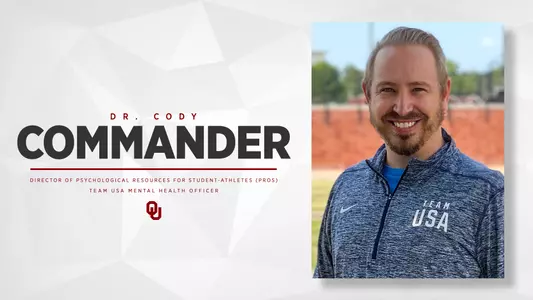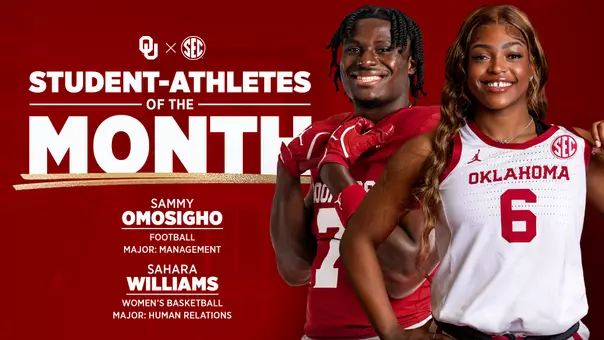University of Oklahoma Athletics

Commanding Mental Health in a Global Pandemic
September 02, 2020 | Athletics
The name "Dr. Cody Commander" sounds like some sort of super-hero. Given Commander's direct involvement with the Summer Olympic Games entangled with the lethal consequences of COVID-19, his name just might be worthy of such a billing.
Commander is Director of Psychological Resources for the University of Oklahoma Student-Athletes (PROS), a position for which he serves roughly 550-600 student-athletes. Commander also was recently selected to serve as Team USA's Mental Health Officer at the Summer Olympics in Tokyo, a position that oversees the well-being of approximately 600 athletes, plus coaches and officials.
Suffice to say, Commander already had a full plate long before a coronavirus pandemic unexpectedly was added to the menu.
Roughly three weeks before COVID-19 overwhelmed the United States with the advent of the "new normal," Commander spoke of his wide-ranging responsibilities at the fast-approaching 2020 Summer Olympics. He described his primary duties as "just me going to the Olympic Games to help manage mental health care for all (Team USA) Olympic athletes. I was going to be the one on call for emergencies and crisis and things like that."
When asked about the coronavirus back in February, Commander knew it would be a hot topic of evaluation. But at that stage, coping with the virus was viewed more like psychological warfare.
"I've worked a lot with people on different types of phobias. With this one, I haven't worked with anybody yet due to it," Commander said at the time. "I've worked with people who had other types of infectious disease phobias, just not specifically with the Corona. I don't know how much of that work I would do over there. I think it's too early to tell now, so it's hard to speculate how it's going to be in late July, early August over there."
By late April, the Games officially had been postponed a full year to July 23-Aug. 8, 2021. If the pandemic is not brought under control by next year, multiple Olympic officials have said the Summer Games in Tokyo would be canceled rather than postponed again.
In the meantime, Commander and his list of Olympic duties continue to evolve. "It's so messy," he said of all the uncertainty. "The Games are scheduled for 2021 right now, so that's what all the athletes will be training for. We're currently working on return-to-practice protocols."
"Professionally speaking, one of the things I enjoy about my field is there are no direct answers with anything. It's all about trying to figure out the puzzle pieces, dealing with it as well as you can."
Dr. Cody Commander
On July 15, the United States Olympic & Paralympic Committee (USOPC) formally announced the addition of Commander and two other independent mental health officers to serve the mental health and holistic needs of Team USA athletes in Tokyo.
Shortly after this announcement, Commander did his best to explain the Olympic alterations and adaptations between February and July and said his job description "changed drastically" with the arrival of COVID-19.
"The USOPC brought me on as a consultant to help develop a strategic planning model for mental health," Commander explained. "With that, I made a strategic plan of how we can build a mental health program for the Olympics and Paralympics. It consists of several different areas. Some of the bigger things we're targeting are telehealth services and the (U.S. Olympic) registry, making sure all athletes have access to mental health care no matter where they are training in the States, trying to find a referral network for them and things like that."
The USOPC's initial quest to accommodate its athletes with a quality mental health program has now intensified immeasurably because of the pandemic.
As a result, Commander said he is building emergency action plans for Team USA athletes at all sites and for all national governing bodies (NGBs). "Wherever they're training, if something happens, there are actual protocols that health care providers can put in place," Commander said. "If there is a sudden death, what do you do about it? If an athlete is suicidal, what do you do about it? We're also helping with coordinating which people involved in the Olympics need to be trained on mental health for providers, coaches, athletic trainers, general things like that, and finding what areas they need to be trained on and how are we going to do that."
Commander's relentless diligence toward this emergency planning has resulted in the newly created position of Director of Mental Health. That person will direct all the mental health care for the USOPC and NGBs.
Commander has been asked to submit questions to be used in the formal interview process. The goal is to have a director hired by mid-fall. Soon thereafter, two additional mental health officers will be hired to work underneath the director. (The USOPC previously hired eight sports psychologists who deal primarily with performance psychology.)
While Commander's duties at OU deal with a specific age group, his USOPC responsibilities cover a much wider spectrum.
"It's hard to generalize Olympic athletes because there are so many sports and age ranges," Commander said. "You have 14-year-olds whose frontal lobes aren't fully developed and they think they're fearless. Then you have 33-year-olds who have been around a while and they're wearing their protective masks to everything and everywhere. There's a broad range of ways that they're coping with (COVID-19). Psychologically, what's harder than it is for collegiate athletes is you'll have some people who were just about at the end of their prime, so 2020 was going to be their last shot at the Games and they may not make the national team now. On the other hand, you'll have athletes who barely didn't make it this year and now have a chance to get to 2021, so they get redemption."
Commander himself has been tested psychologically with the postponement of the Summer Games.
"I almost feel like a backup player who got called in and has just been itching for their time to shine in a way," Commander said. "I'm ready for it. I'm excited. Hey, let's take care of business. When the Games got postponed for a year, I was bummed at first, but then I got excited thinking about how this thing only gets built once. It's definitely been a challenge. There are so many moving parts that I didn't understand when I first came on board. I think professionally speaking, one of the things I enjoy about my field is there are no direct answers with anything. It's all about trying to figure out the puzzle pieces, dealing with it as well as you can."











